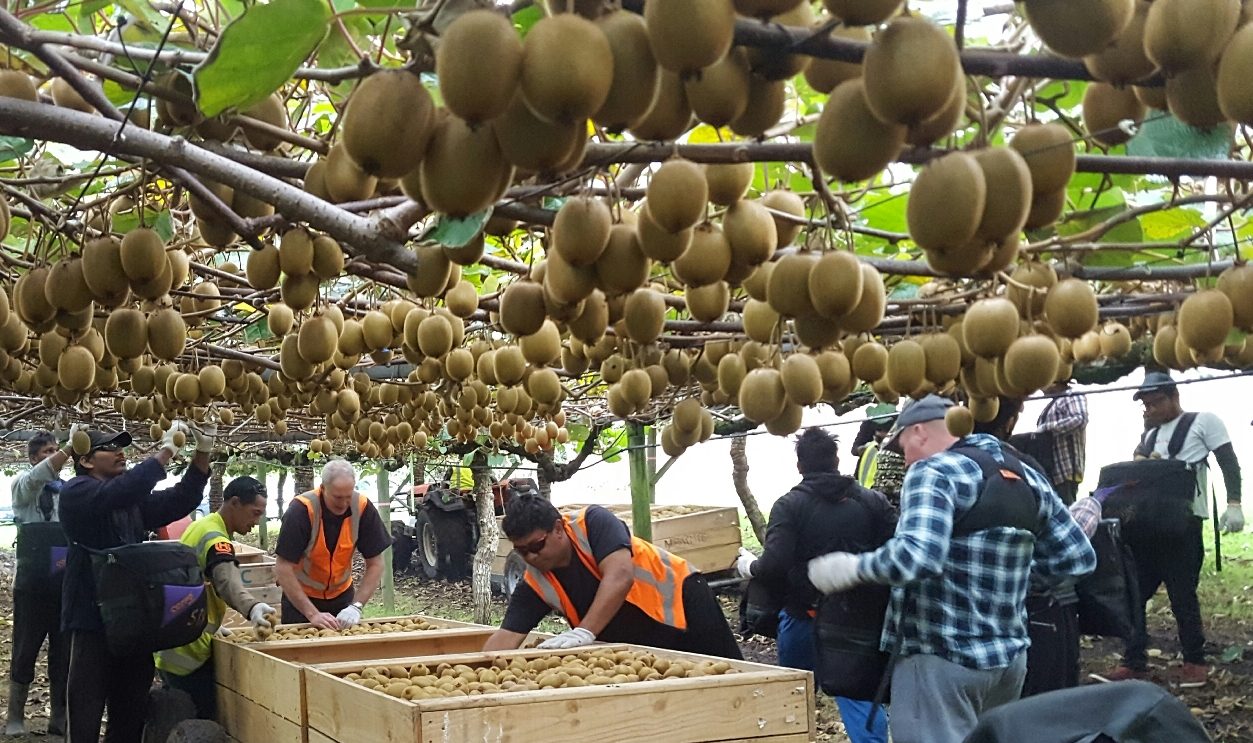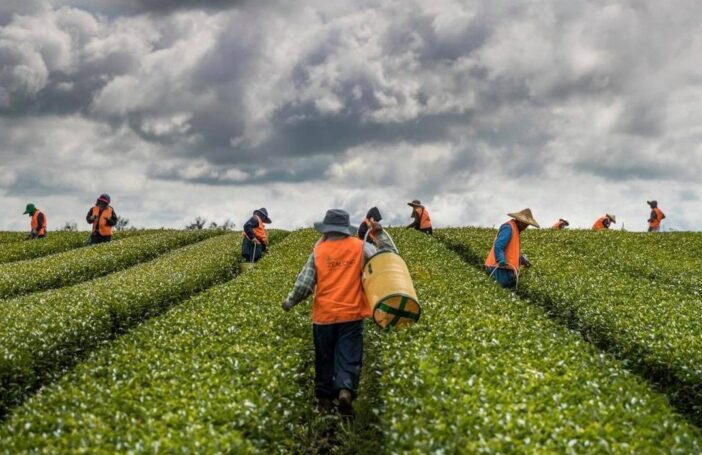The New Zealand coalition government’s recent changes to Recognised Seasonal Employer (RSE) policy settings were a topic of much discussion at this year’s annual RSE conference which was well-attended by RSE employers, industry bodies, government officials, Pacific country representatives and other key stakeholders.
RSE employers were upbeat about the policy changes which will help to reduce their costs of participation, a key outcome that employers and industry groups have been lobbying for.
After 17 years of operation, the RSE scheme is still dominated by small producers – 62% of the 179 active employers in 2024 recruited fewer than 50 workers each, with half of those recruiting fewer than 20 workers. For many of the scheme’s smaller producers, rising employment costs and tightening profit margins, especially in the wake of the pandemic, have made RSE participation potentially unsustainable.
For Pacific countries, the three changes to policy settings that directly affect workers’ take-home pay– removing the requirement for employers to pay all RSE workers 10% above the minimum wage, removing the guaranteed payment for 30 hours’ work per week, and lifting the freeze on worker accommodation charges — are less welcome.
From September, the 10% loading above minimum wage is only applicable to RSE workers in their third and subsequent seasons of work. Arguably, this change has been implemented to recognise the skills and experience of returning workers – recognition that Pacific countries have sought for returning workers for some time. But there are several problems with imposing a blanket requirement to pay those in their third or subsequent season a higher wage than a new RSE recruit.
First, data on RSE worker return rates over the 17 years from 2007 to 2024 show that for many Pacific countries the average number of seasons worked is below three (Figure 1). Workers from Vanuatu – the largest RSE supply country – return on average for three seasons, while for Samoa and Tonga, it is 2.9 seasons and 2.8 seasons respectively. All other Pacific countries have lower return rates. It is only Asian countries whose workers, on average, return for more than three seasons, and will therefore repeatedly benefit from the higher wage rate.

Second, setting a wage rate based on the number of seasons worked encourages people to return more often to New Zealand to earn more money, whether they are particularly productive workers or not, and when it may not be in the best interests of their partners, children and extended family members who remain at home.
Third, basing higher wages simply on length of service doesn’t automatically recognise skills and productivity. There could well be workers in their second season who are more skilled and productive than those who continue returning. Moreover, there could be workers who have spent their first two seasons working with a particular crop (perhaps picking mandarins) who are shifted to a new crop in their third season (say, pruning grapevines) and who are automatically being paid more for performing a task in which they are not yet skilled.
An alternative is to leave decisions about rewarding skills and experience to the discretion of the employer. This has historically been the approach, and employers already have a range of ways in which they choose to reward workers, whether in the form of higher wages, or via other incentives such as payment of the workers’ full return airfare costs or subsidies for weekly accommodation charges.
The requirement for RSE employers to guarantee payment for at least 30 hours’ work per week was introduced during the pandemic as a protective mechanism to ensure workers stranded in New Zealand could cover their weekly living expenses. Under the new policy settings, RSE employers must guarantee payment for 30 hours per week averaged over four weeks (that is, they must now guarantee payment for at least 120 hours’ work over four weeks).
According to National MP Catherine Wedd who spoke at the conference, this shift to an averaging approach has been made so that we can “better compete with Australia”. This makes little sense; it is unclear how diluting worker protections in the form of guaranteed pay, as well as paying them less, makes New Zealand more competitive in the eyes of the Pacific.
One of the ways in which New Zealand has historically tried to differentiate the RSE scheme from Australia’s Pacific Australia Labour Mobility (PALM) scheme is by arguing that, while Australia pays higher wages, we have a scheme that is built on strong employer-employee relationships, a high standard of pastoral care and strong worker protections.
Now it seems Australia offers both higher wages and better worker protections. While PALM Approved Employers are also required to guarantee 30 hours’ pay averaged over four weeks, they have a guaranteed minimum pay threshold of A$200 per week to ensure workers’ pay does not drop below this level after deductions. Moreover, if a PALM employer cannot offer 20 hours of work in any given week, then the employer must cover the cost of the worker’s accommodation and transport – and these costs are not recoverable from the worker.
There are no similar protections under the RSE scheme. Now, workers have their wages averaged over a four-week period but will, in all probability, still be paying weekly deductions, with no minimum pay threshold in place. Furthermore, with the removal of the freeze on weekly accommodation charges, workers will likely be paying more each week in rent.
Notwithstanding the problems above, some changes to RSE settings are warranted. Employers have valid concerns about rising costs, especially for many of the scheme’s small producers. Fundamentally, the RSE scheme is employer-driven, so it needs to remain financially viable for employers to recruit from the Pacific if the scheme is to survive.
The main concern here is about the lack of consultation with the countries that supply the people who will be most affected by the changes.
Pacific stakeholders are still waiting for anything meaningful to come out of the RSE policy review which started pre-pandemic, was completed in 2023, and has been languishing since then. The current round of policy changes was, on the other hand, pushed through in a matter of weeks.
Given arguments can be made both for and against the recent changes, proper consultation with Pacific stakeholders would have been prudent. As Vanuatu’s High Commissioner to New Zealand, Jimmy Nipo, noted in his presentation, realising the benefits of the RSE scheme is a balancing act. Balancing the benefits for New Zealand and for Pacific countries – and maintaining important bilateral and regional relationships – requires regular, open dialogue.





How does the truth in the statement, “it seems Australia offers both higher wages and better worker protections,” correlate to the reality , or the perceptions.
Many workers who register through my agency want to go to Australia because of the perception that wages are higher and therefore they earn more. (That, and that Australia is warmer. They don’t know about Tasmania, since they only equate it as red deserts and kangaroos!) The reality is quite different.
That reality is caused by the latter part of the above sentence, “better worker protections,” Nether parts of the statement is false, as there are indeed higher wages and better worker protections, however it is also important to note that for reasons unknown [ok, let’s not kid ourselves- we do know], there are more welfare issues occurring amongst PALM workers than within RSE workers, so despite “better worker protections,” the workers appear to be more vulnerable. But that is in itself an issue as it is all perception – the perception imposed on seasonal workers in Australia that they are being exploited as told to them by many groups. Meanwhile most RSE workers are quite content and feel safe. At least mine do.
But here are the comparisons
1. Tax NZ = 10.5%, AU = 15%.
2. Work type: NZ Piece Rate dominates, AU – Hourly dominates
3. Hours: NZ (No overtime) workers are very happy to work as many hours as possible. AU (Overtime) vast majority of farms limit hours to max 38 hours per week.
4. Increase to accommodation: NZ and AU both up to 15% PA.
4. Minimum hours: NZ and AU now both guaranteed 120 hours over 4 weeks.
That last point is important. When Australia tried to bring in a 30 hour minimum per week rule (was going to be in effect 1 July 2024), there was a 25-40% drop in worker numbers, with some approved employers pulling out or threatening to pull out of the scheme. That was alleviated by a pause until 1 July 2025. And THAT is where thousands of Pacific seasonal workers lost – effectively finding themselves out of a job, having surrendered their places to much cheaper backpackers.
Quantitative evidence shows that RSE workers on a piece rate, and given no limitation on hours (but within expected health and safety requirements), and given better crop reliability, not only make more per hour compared to their Australian counterparts, but more hours per week to add to a substantial income. When one factors in wages, tax, deductions and living expenses, and allowing for super (PALM) vs holiday pay (RSE) the RSE worker nets significantly more net returns over a seven month stint than their PALM candidates make in 9 months.
When considering the “guaranteed minimum $200 per week,” the requirements are the employer must pay a minimum of 20 hours per week is a redundant factor given that the PALM employer under the deed can “top up” hours to meet the threshold, while in NZ, the RSEs very rarely have a situation where workers are working less than, a $200 earning, or 20 hours per week. And where it does happen, it is highly likely the week before and after they worked 40-50 hours.
All I know is that the Vanuatu workers I send to NZ for RSE work love their jobs, their accommodation, their employers and New Zealand. And the RSE staff love them in return. So maybe that is why Pacific Island RSE workers win?
At the end of the day, the compromises appear to be helpful to the needs of employers, and add stability of work for employees. Drastically swinging the pendulum either way is most likely to hurt both RSEs and seasonal workers.
Hi Dan
Thanks for your comprehensive comments on both schemes. I agree, different work types and rules on hours of work mean the picture around earnings in NZ vs Australia is much more nuanced.
However, the announcements about the RSE policy changes took a lot of people, especially the Pacific participants at this year’s RSE conference, by surprise. There was genuine concern from Pacific delegates that there had been no consultation with them about the changes and whether they could be phased in to avoid confusion about the reality of lower earnings for RSE workers in the coming season. As the Vanuatu High Commissioner to NZ said in his presentation, it’s important to keep all stakeholders in the loop and on board with proposed policy changes.
Thanks again for your very useful reflections.
Charlotte